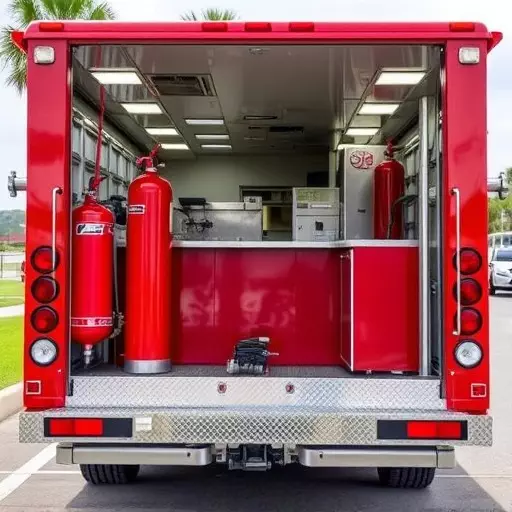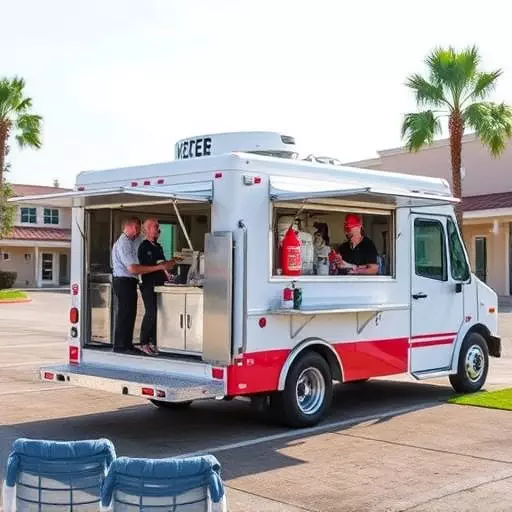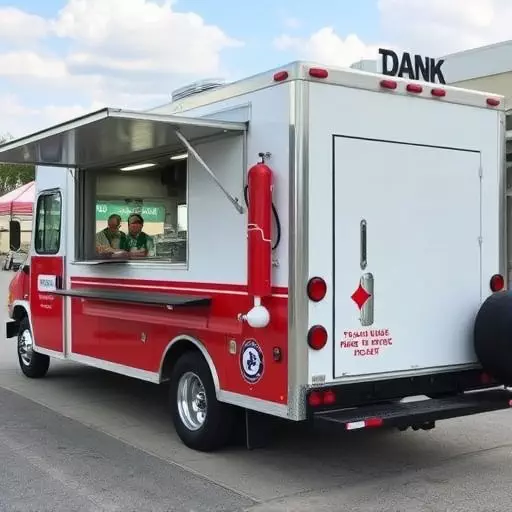Food trucks in Jacksonville face unique fire hazards due to their confined spaces and cooking equipment. Installing a reliable food truck fire suppression system is crucial for early fire detection, automatic activation, and rapid flame control, minimizing damage and enhancing safety. These modern systems use energy-efficient, environmentally friendly agents, offering cost savings through reduced water damage and minimized downtime. Expert installation, tailored to each truck's needs, followed by regular maintenance checks, ensures optimal performance and peace of mind for operators. Proper maintenance is vital for system longevity, reliability, and cost efficiency, making it a strategic investment for Jacksonville food truck businesses.
In the dynamic world of mobile culinary ventures, food trucks face unique challenges, including elevated fire risks due to their compact spaces and constant operation. This article explores an innovative solution: energy-efficient fire suppression systems tailored for food trucks. We’ll delve into the critical aspects, from understanding fire hazards to the installation process in Jacksonville and maintenance tips for prolonged protection. Discover how these advanced systems offer enhanced safety without compromising efficiency.
- Understanding Fire Risks in Food Trucks
- The Role of Suppression Systems: How They Work
- Advantages of Energy-Efficient Fire Suppression Systems
- Installation Process for Food Trucks in Jacksonville
- Maintenance and Longevity: Ensuring Continuous Protection
Understanding Fire Risks in Food Trucks

Food trucks, despite their mobile nature and seemingly lower risk profile, actually pose unique challenges when it comes to fire safety. The close quarters, combination of cooking equipment and fuel sources (like propane tanks), and frequent power fluctuations create a volatile environment. A fire in a food truck can spread quickly, causing significant damage to the vehicle and posing serious risks to the operator and customers.
In Jacksonville and beyond, installing a reliable food truck fire suppression system is essential for mitigating these risks. These systems are designed to detect fires early, activate automatically, and suppress flames before they can escalate. By understanding the benefits of such systems—including faster response times, minimized damage, and enhanced safety—food truck operators can take a proactive step towards protecting their business and patrons.
The Role of Suppression Systems: How They Work

Fire suppression systems play a pivotal role in ensuring the safety of food trucks and their occupants. These systems are designed to quickly detect and extinguish fires, minimizing damage and saving lives. In the event of a fire, traditional methods rely on manual intervention for evacuation and water application, but modern food truck fire suppression systems take a proactive approach. They automatically activate upon sensing heat or flame, releasing agents like dry chemical or carbon dioxide to smother the fire.
Installation of these systems in Jacksonville offers numerous benefits. Firstly, they provide immediate fire control, suppressing flames before they can spread. This is crucial for food trucks, which often operate in tight spaces and have various flammable materials nearby. Secondly, modern suppression systems are energy-efficient, utilizing clean agents that pose minimal environmental impact. Unlike traditional water-based systems, these agents don’t cause extensive water damage to the truck’s interior. Benefits extend to cost savings as well; regular maintenance ensures optimal performance, reducing the risk of costly and disruptive fire-related incidents.
Advantages of Energy-Efficient Fire Suppression Systems

Food trucks, known for their vibrant and bustling atmosphere, face unique challenges when it comes to fire safety. Traditional fire suppression methods can be energy-intensive and may not always be suitable for these mobile kitchens. This is where energy-efficient fire suppression systems come into play, offering a game-changer in food truck safety. By prioritizing sustainable and eco-friendly solutions, these modern systems provide several advantages.
One of the key benefits is reduced operational costs. Many conventional fire suppression mechanisms require significant energy to activate and operate, impacting the overall efficiency of the food truck. In contrast, energy-efficient alternatives are designed to minimize power consumption without compromising effectiveness. This allows food truck owners in Jacksonville to save on fuel expenses and maintain a leaner operational budget. Furthermore, these advanced systems can contribute to environmental sustainability by lowering carbon emissions, making them an attractive option for eco-conscious businesses.
Installation Process for Food Trucks in Jacksonville

Installing a food truck fire suppression system in Jacksonville involves careful consideration and expertise to ensure it meets both safety standards and operational needs. The process begins with an assessment of the truck’s interior, taking into account the specific cooking equipment and potential hazards. A qualified professional will design a tailored suppression solution, often utilizing innovative technologies like dry chemical or gas-based systems. These systems are strategically placed to quickly respond to fires, minimizing damage and ensuring the safety of the food truck operators.
The actual installation requires precise placement of fire suppressors, detectors, and control panels. Professionals ensure these components integrate seamlessly with the truck’s electrical and mechanical systems. Regular maintenance checks are crucial post-installation to guarantee optimal performance when needed. Benefits include enhanced food safety, reduced downtime due to fires, and peace of mind for owners, all contributing to a more successful and secure food truck operation in Jacksonville.
Maintenance and Longevity: Ensuring Continuous Protection

Proper maintenance is key to ensuring the longevity and effectiveness of a food truck’s fire suppression system. Regular checks by qualified technicians are essential to verify all components are functioning optimally and at their highest capacity in case of an emergency. This includes inspecting fire extinguishers, checking for proper pressure levels in gas-based suppression systems, and testing the overall integrity of the entire network.
Investing in routine maintenance pays dividends over time. By keeping the system in top condition, food truck owners can expect a more reliable response during a fire incident. Moreover, regular maintenance helps prevent costly repairs or replacements, ensuring a higher return on investment for the initial installation of a food truck fire suppression system in Jacksonville.


